The Most to Least Affectionate Myers-Briggs® Personality Types, Ranked
Ever wonder how affectionate your Myers-Briggs® personality type is compared to others? Some types are likely to wear their hearts on their sleeves, while others tend to keep their warm gestures under wraps. From the enthusiastic bear hugs of an ESFP to the reserved nods of an INTJ, we’ve ranked the Myers-Briggs® types from the most to least affectionate.
The reason behind our rankings? In the Winter of 2023/2024 I ran a huge survey about how the 16 personality types give and receive love. This survey was done in preparation for a talk I was presenting for the Association for Psychological Type International’s Winter Conference. During that survey, I asked the types what their primary love language was and whether or not they felt loved through physical affection. The answers and comments revealed a lot of unique patterns about type!

Based on the data of over 1500 respondents, I ranked the types using a combination of data points:
– Whether or not they answered “Yes” to the question “Does physical affection make you feel loved?”
– What percentage of respondents answered “Rarely” or “No” to the question “Does physical affection make you feel loved?”
– Whether “Physical Touch” was their primary love language
With that in mind, let’s dive into our guide to see who is the cuddliest of the personality types!
Disclaimer: While this ranking offers a playful and informative look at how different Myers-Briggs types might generally express affection, it’s important to remember that personality is deeply individual and influenced by a multitude of factors beyond just type. Each person is unique, and there can be significant variation even within the same MBTI® type. Our insights are not prescriptive and should not be taken as definitive judgments of character. Factors such as personal experiences, cultural background, and individual values play a crucial role in shaping how each person expresses affection. We encourage readers to consider these nuances when relating the content to themselves or others.
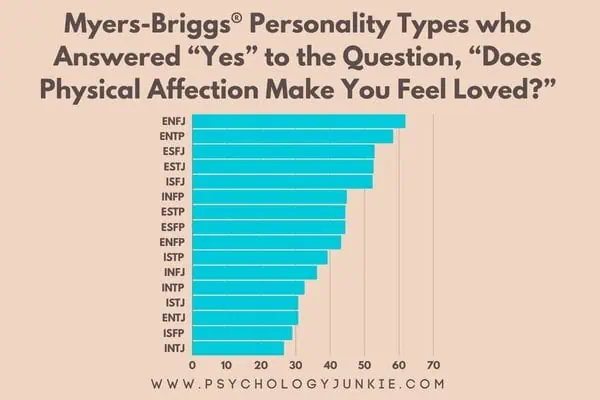
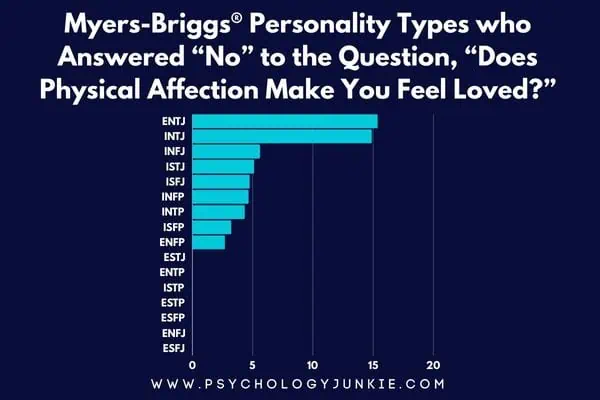
The Most to Least Affectionate Myers-Briggs® Personality Types, Ranked
Table of contents
- The Most to Least Affectionate Myers-Briggs® Personality Types, Ranked
- #1 The ENTP “Trailblazer”
- #2 The ENFJ “Mentor”
- #3 The ESTP “Daredevil”
- #4 The ESFP “Champion”
- #5 The ESTJ “Captain”
- #6 The ESFJ “Defender”
- #7 The ENFP “Visionary”
- #8 The ISTP “Vigilante”
- #9 The ENTJ “Director”
- #10 The ISFJ “Protector”
- #11 The INFP “Dreamer”
- #12 The INFJ “Mystic”
- #13 The ISTJ “Detective”
- #14 The INTP “Prodigy”
- #15 The ISFP “Virtuoso”
- #16 The INTJ “Strategist”
- What Do You Think?
Estimated reading time: 18 minutes
#1 The ENTP “Trailblazer”
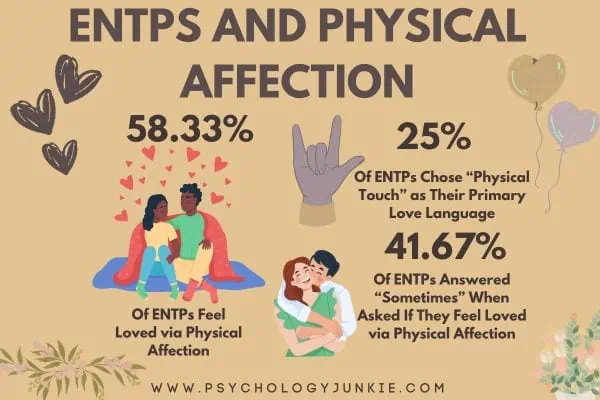
ENTPs have a reputation for being innovative, logical, and argumentative. But they’re also surprisingly affectionate!
When asked if physical affection makes them feel loved, 58.33% answered “Yes”, 41.67% answered “Sometimes”, and no one responded with “No.” 25% of ENTPs also chose this as their primary love language (the 4th highest percentage of all of the 16 types).
In my survey, “Affection” was the most frequent answer ENTPs gave when asked how they most want to receive love in a relationship. But keep in mind that affection is never a one-size-fits-all approach. They may be cuddly and lovey-dovey with some people, while more reserved with others.
#2 The ENFJ “Mentor”
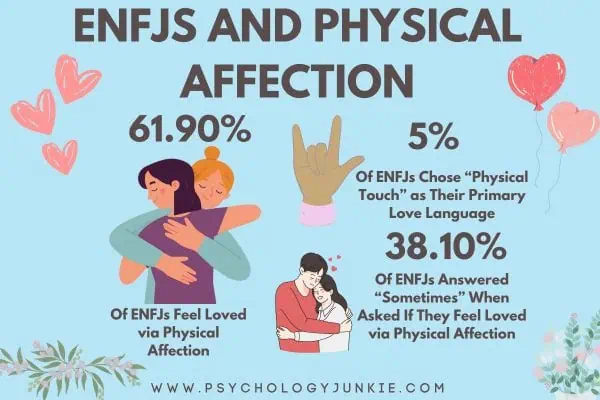
61.90% of ENFJs answered “Yes” to the question “Does physical affection make you feel loved?” while 0% answered “No.” For ENFJs, a warm hug, a high-five, or even a pat on the back make communication more meaningful, intimate, and engaging.
Does this mean that an ENFJ is going to bombard you with hugs the minute you say hello?
Yikes! Not really.
Mentors have a gift for “reading people” so they’re not going to get all touchy-feely if they feel like someone needs more personal space or isn’t quite sure of them yet. Thanks to their Extraverted Feeling side, they have a quick ability to understand someone else’s comfort level, and they’ll adjust accordingly.
Find out more about ENFJs: The Blessing and the Curse of Being an ENFJ Empath
#3 The ESTP “Daredevil”
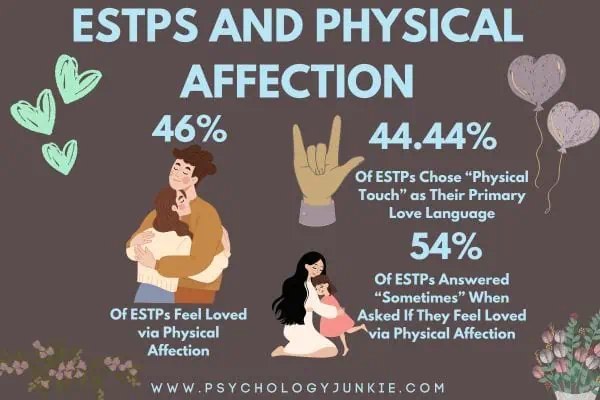
46% of ESTPs answered “Yes” to the question “Does physical affection make you feel loved?” and 44.44% also list “Physical Touch” as their #1 love language, the highest percentage of any personality type!
ESTPs are physical people by nature. They’re in touch with the world around them and enjoy being interactive, hands-on, and connected. In relationships, a cuddle, kiss, or a high-five help to amp up the whole experience and make it more immersive. This is likely why they had the highest number of votes of any of the types for “Physical Touch” as their primary love language.
Does this mean that an ESTP will be all cuddly and snuggly with anyone they meet?
Absolutely not!
ESTPs read people well, and they also give their affection to people in a very context-dependent way. An ESTP is not going to meet up with an acquaintance and snuggle. No. They might shake hands or give a high five, but they’re aware of the socially acceptable type of affection for the specific relationship. In romantic relationships they’re much more likely to go all out with lots of cuddles and kisses and touches, but not so much in day-to-day relationships.
Daredevils also know how to read the room and sense other people’s comfort levels. They’re highly observant and can easily tell when someone needs more space or would be more receptive to affection. Because of this, they’re going to adjust their presentation depending on who they’re with.
Discover more about ESTPs: The Top 7 Gift Ideas for ESTPs
#4 The ESFP “Champion”
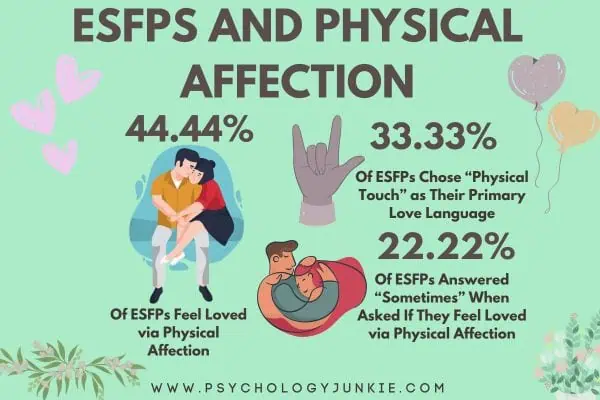
Action-oriented and expressive, ESFPs mentioned hugs and physical affection more than anything else when I asked them how they liked to give and receive love. When it came to the love languages themselves, 33.33% listed it as their primary love language.
But this doesn’t mean physical affection always makes ESFPs feel loved. 44.44% answered “Yes” when asked if physical touch makes them feel loved, while 22.22% answered “Sometimes,” and 22.22% answered “Often.”
One ESFP remarked, “I get a quick read on someone and can tell whether I want to hug or not. If I get a whiff of insincerity or creepiness, I definitely DO NOT want a hug.” So approach with caution if you’re a stranger, especially if you’re a man approaching a female ESFP (this was mentioned a lot).
#5 The ESTJ “Captain”
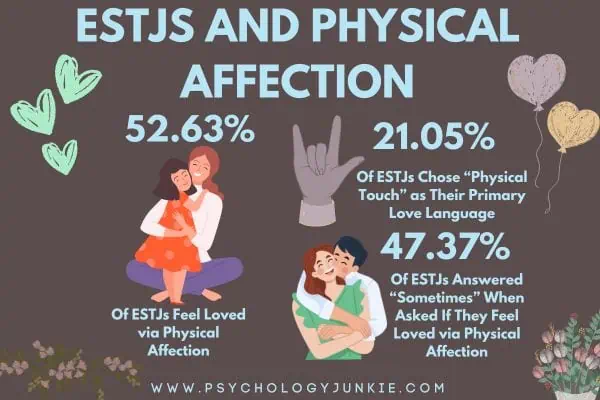
While ESTJs might seem all business and no-nonsense to strangers, when it comes to relationships they’re much more cuddly and affectionate.
52.63% of ESTJs said that they feel loved via physical affection, and 21.05% chose this as their primary love language. When asked how they wanted to give and receive love, hugs and affection came up again and again!
So if you thought ESTJs were all serious and detached, think again! If you’re in a relationship with this type, a warm hug rather than a business-handshake is probably the best approach!
#6 The ESFJ “Defender”
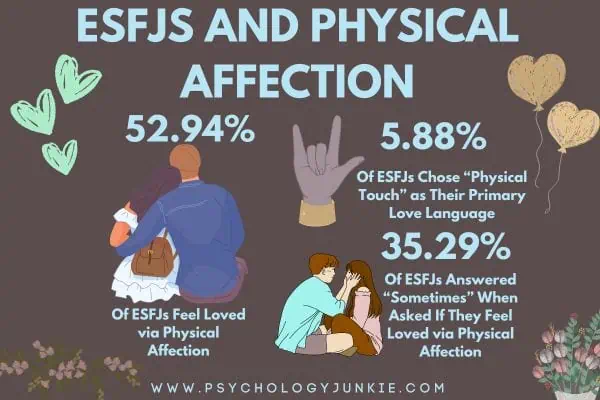
52.94% of ESFJs responded “Yes” to the question “Does physical affection make you feel loved?”, 35.29% answered “Sometimes,” and 11.76% answered “Often.”
For Defenders, a kind hug, a reassuring pat on the shoulder, or an encouraging squeeze of the hand heighten connection and deepen relationships to a more intimate level.
Yet, while they love affection, only 5.88% of ESFJs chose “Physical Touch” as their primary love language, as opposed to 44.44% of ESTPs.
So while ESFJs enjoy physical affection, it’s not the primary way they receive love. Their top love language is quality time followed by acts of service. ESFJs need to feel connected one-on-one to feel loved, and they want your actions to line up with your level of commitment.
#7 The ENFP “Visionary”
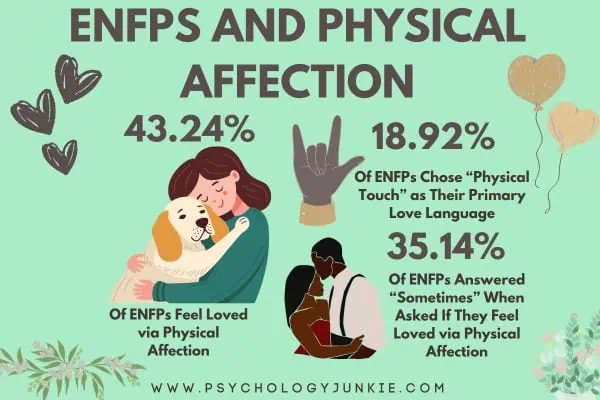
ENFPs are idea people, but they also have a warm, affectionate physical side as well. 18.92% choose “Physical Touch” as their primary love language, the 6th highest of all the personality types. 43.24% answered that they do feel loved via physical affection, with 35.14% answering with “Sometimes.” 10.81% of ENFPs said they rarely feel loved via physical affection.
The deciding point? Your intentions. ENFPs are highly conscious of the authenticity level of others. They can quickly read whether someone is being genuine or shifty. If you don’t seem 100% authentic with them they’re not going to want to get close.
One ENFP commented, “I don’t mind quick, casual hugs with strangers, but if you seem phony or creepy, I’m definitely staying away. Another ENFP stated, “Physical affection and touch is my top love language! It’s a healthy, normal, and very real need that I feel we’re heavily deprived of it as a society.”
Find out more about ENFPs: How ENFPs Say “I Love You”
#8 The ISTP “Vigilante”
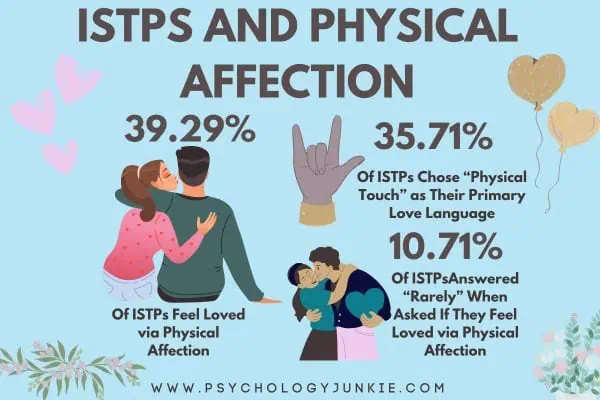
ISTPs were an interesting group of respondents! This type was the 2nd most likely type to list “Physical Touch” as their primary love language (35.71% voted for this), but 10.71% said they rarely feel loved via physical affection.
The difference? Context. ISTPs don’t want complete strangers trying to get physical with them, and sometimes in family relationships affection can feel more like an obligation than a sincere act of love But in romantic relationships things change. “I love to hug, massage, kiss, hold hands with my girlfriend. Do I want that with my co-workers? Heck, no” said one ISTP respondent.
Overall, 39.29% of ISTPs said they feel loved when receiving physical affection, but primarily in romantic or very close family relationships. Intimacy and touch came up repeatedly when we asked ISTPs how they like to show and receive love, but again, this was primarily in romantic relationships.
Discover more about ISTPs: 10 Things ISTPs Look For in a Relationship
#9 The ENTJ “Director”
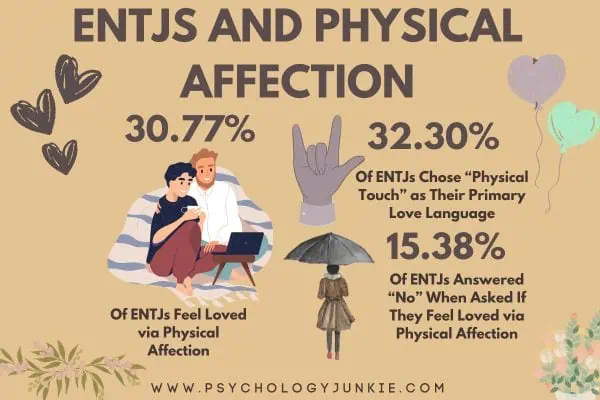
ENTJs were a really mixed group of respondents! While 32.30% said physical touch was their primary love language, a startling 15.38% said that they don’t feel loved via physical affection (second only to INTJs). That made it hard for me to decide where to rank them. And the comments were varied as well!
I like physical intimacy in a relationship, but nowhere else,” one ENTJ admitted. Another chimed in with, “I hated being forced to give family members hugs growing up. I’m never making my kids do this.” Yet quite a few said that in romantic relationships it was a key part of feeling validated, cared for, and supported. My advice? Approach each ENTJ with respect for their personal space until you know them and their preferences. And if you’re in a relationship, ask them directly how they feel about it rather than making assumptions.
#10 The ISFJ “Protector”
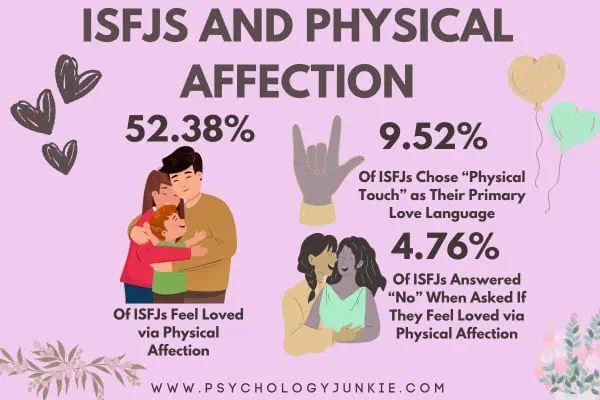
ISFJs tend to be a bit more reserved and quiet, but this doesn’t mean they don’t love a good cuddle!
52.38% of ISFJs answered “Yes” when asked if physical affection makes them feel loved, while 35.71% said “Sometimes.” In the comments, quite a few said it was context-dependent. With family and friends, hugs, high-fives, cuddles, and cheek-kisses are a definite plus. With significant others, even more so! But ISFJs don’t like physical affection from strangers or people they don’t know very well. That can make them uncomfortable really fast.
“Physical touch” is the primary love language for 9.52% of ISFJs, with words of affirmation and quality time taking first and second place, respectively. When asked how ISFJs like to show love most, “Hugs” came up again and again, along with offering emotional support, listening, and preparing food! So while ISFJs may be on the quiet side, they definitely have a warm, supportive, and affectionate nature for those closest to them.
Discover more about ISFJs: Your Guide to ISFJs and Relationship
#11 The INFP “Dreamer”
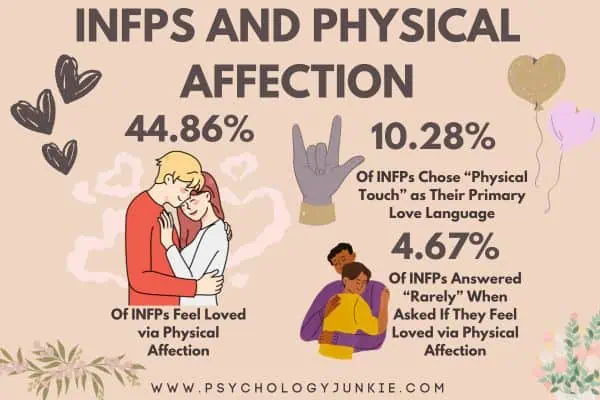
44.86% of INFPs said that they feel loved via physical affection, with 10.28% choosing this as their primary love language. One INFP commented, “I love receiving physical affection. And I enjoy giving it as well. But I do my best to make sure the other person is comfortable, too.”
When I asked INFPs how they like to show and receive love, many mentioned “gentle touches.” But before you get really touchy-feely with this type, you need to make sure they feel they can trust you and have a real connection with you. In dating or intimate relationships, Dreamers need to feel like they are really known by their partner, seen for who they really are. Their top love language, Quality Time, is key. INFPs crave one-on-one time with their partner where they can really dive into their likes, dislikes, tastes, and personal values. Once a level of trust and connection is sparked, then the physical affection will take on a more meaningful tone.
Find out more about INFPs: 10 Things You Crave Every Day as an INFP Personality Type
#12 The INFJ “Mystic”
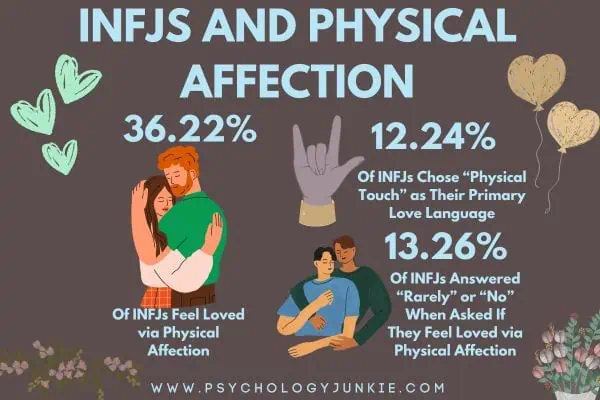
36.22% of INFJs said that they feel loved via physical affection, with 47.96% saying they sometimes do, and 7.65% admitting they rarely do. “Physical touch” is the primary love language for 12.24% of INFJs, after quality time, words of affirmation, and acts of service.
There were a wide variety of comments and responses from INFJs in the survey. Quite a few said they adore physical affection, but most said it wasn’t the primary way to their hearts. For them, in-depth conversation, authenticity, and shared values were much more important. A kind word, some quiet time spent together, or a selfless act made more of an impression.
I am so much more affectionate than my partner,” one INFJ commented. “I want to cuddle everyone I love so much more than they want it. But I also know how to read the cues enough to hold off because a lot of people aren’t prepared for it.”
Another INFJ said, “I love affection from my partner, but only them. And only when I’m not trying to get something else done.”
Overall, this was a group with very mixed reactions. For the most part, the majority appreciated physical affection, but only when a trusting relationship was already established.
Discover more about INFJs: How INFJs Say “I Love You”
#13 The ISTJ “Detective”
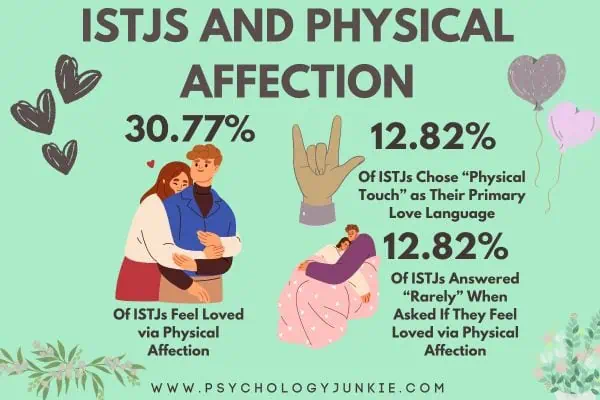
ISTJs were a little more reserved and skeptical about physical affection. “Please don’t greet me with a big hug unless that’s a cultural thing for you or I’m dating you,” one remarked. While 30.77% feel loved through touch, a notable 12.82% respond with “rarely,” with many clarifying that they only liked it with close friends, family, or romantic partners.
Only 12.82% of ISTJs claimed that physical affection is their primary love language, with Quality Time and Acts of Service taking 1st and 2nd place, respectively.
One ISTJ shared, “I appreciate a hug after a long day, but it’s the steady support and trust that make me feel loved.” Another said, “It’s my top love language, but I wonder if that’s more because of my childhood than my personality.
For this type, physical affection is best in established, stable relationships where they feel secure and understood. Around unfamiliar faces or in overly casual contexts, some ISTJs may not respond as warmly, opting for a more reserved approach until they feel the moment is right.
#14 The INTP “Prodigy”
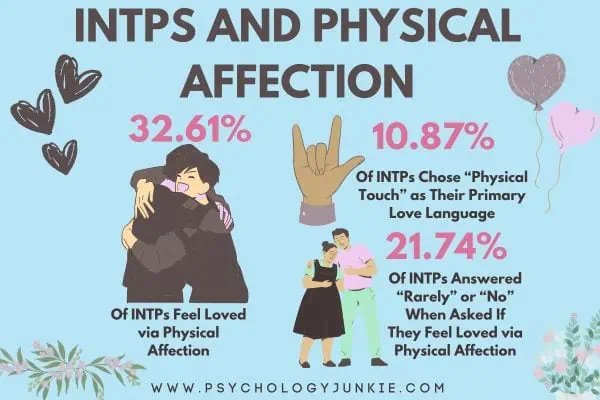
There was a lot of diversity in the responses of INTPs! One INTP commented, “Physical Touch is my top love language. I don’t get it much so I make do with the other ones. It’s the most “special” of them though, most direct route to my feelings.” Another INTP said, “I love physical affection, but I don’t always feel comfortable initiating it and it’s not a surefire way to make me feel truly loved.”
Overall, 32.61% of the INTPs I surveyed said they feel loved via physical affection, and 10.87% chose this as their primary love language. But a startling 17.39% said they rarely feel loved through physical touch, with one commenting, “I don’t like intrusive touch. I feel my energy draining because it feels like it’s for the other person and not for me.”
So it really all depends with INTPs, and I’d definitely approach this type without any preconceptions but with curiosity, asking them what they prefer directly rather than making assumptions!
Discover more about INTPs: How INTPs Say “I Love You”
#15 The ISFP “Virtuoso”
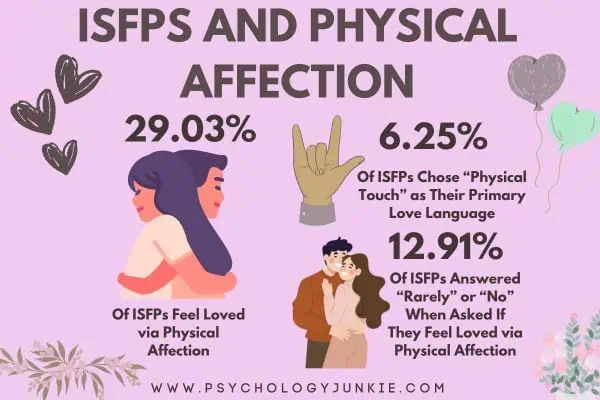
In most of my responses from ISFPs, there was a strong desire for physical affection in trusting, intimate relationships. But it was unlikely for this to be a top love language. Only 6.25% of ISFPs chose this as their primary love language, with quality time, words of affirmation, and acts of service getting more votes.
I’m very physical and touchy so I need that in a relationship,” one ISFP commented, “but most of the time I don’t like acquaintances touching me.
29.03% of ISFPs answered “Yes” to the question, “Does physical affection make you feel loved?” with 48.39% answering “Sometimes,” and 9.68% answering “Rarely.”
For most ISFPs, established trust and camaraderie are key to touch being received with warmth rather than skepticism.
Find out more about ISFPs: How ISFPs Say “I Love You”
#16 The INTJ “Strategist”
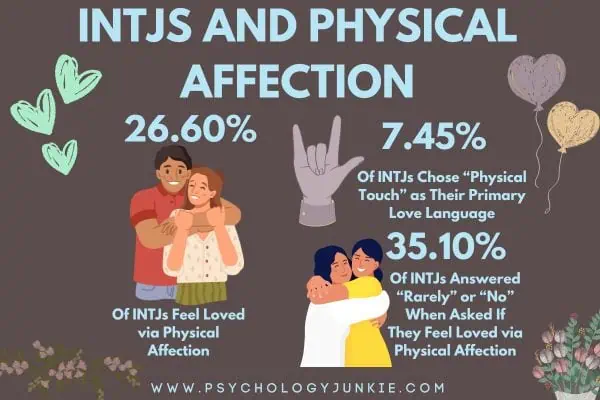
Overall, INTJs are more skeptical of physical affection and prefer to keep things hands-off with acquaintances and strangers. But there were also quite a few who said that they loved snuggling up with their romantic partners or showering their children with affection.
Only 26.60% of INTJs said that they feel loved via physical affection, the lowest percentage of all the types. 7.45% chose this as their primary love language, and 14.89% said that they do not feel loved via physical affection, with 20.21% saying they rarely feel loved this way.
One INTJ commented, “I need my personal bubble. If I can tell this is natural for you, that it’s just part of who you are to give a greeting hug, that’s okay. But with most people, I just don’t want them in my space.” Another said, “I could never give too many hugs to my kids or my spouse, but everyone else can back off.”
INTJs generally hate being interrupted or overwhelmed by other people. So if they’re in the middle of a work task, best not to interrupt them with a sudden, unexpected display of affection. But if you’re cuddling up to watch a movie and you’re in a relationship? You’re probably good to go. As with all the types, approach each individual as just that: an individual. Remember 7.45% of INTJs still do see this as their primary mode of receiving love. With 345 respondents, that’s still 25 INTJs who really want that affection!
Discover more about INTJs: 10 Things People Misunderstand About INTJs
What Do You Think?
How do you feel about physical affection? Do you love it, hate it? Let us know your thoughts and perspectives in the comments!
Find out more about your personality type in our eBooks, Discovering You: Unlocking the Power of Personality Type, The INFJ – Understanding the Mystic, The INTJ – Understanding the Strategist, and The INFP – Understanding the Dreamer. You can also connect with me via Facebook, Instagram, or Twitter!
Subscribe to Our Newsletter

Want to discover more about personality type? Get the inside scoop with Susan Storm on all things typological, along with special subscriber freebies, and discounts on new eBooks and courses! Join our newsletter today!


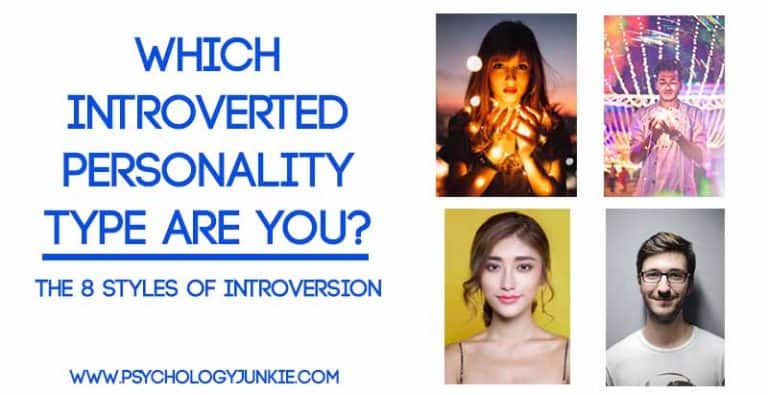
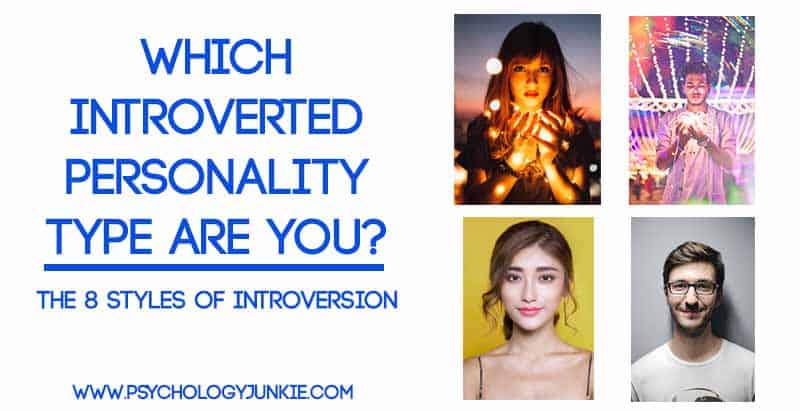
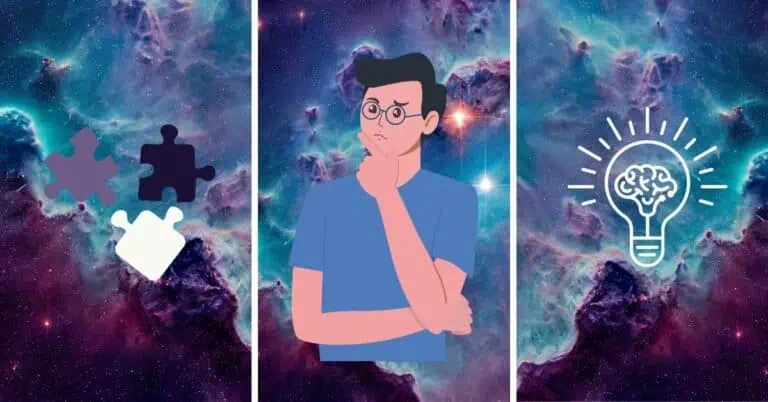
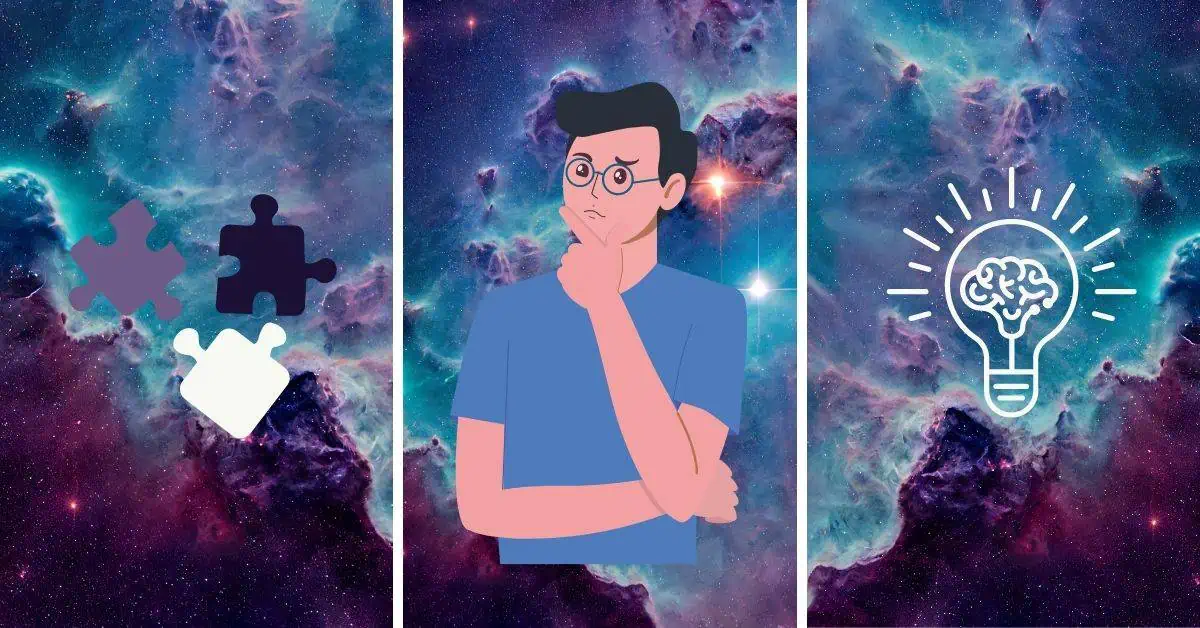




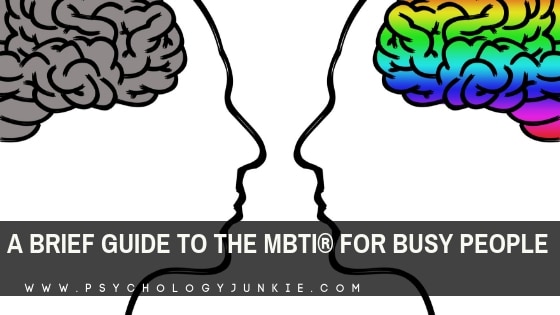
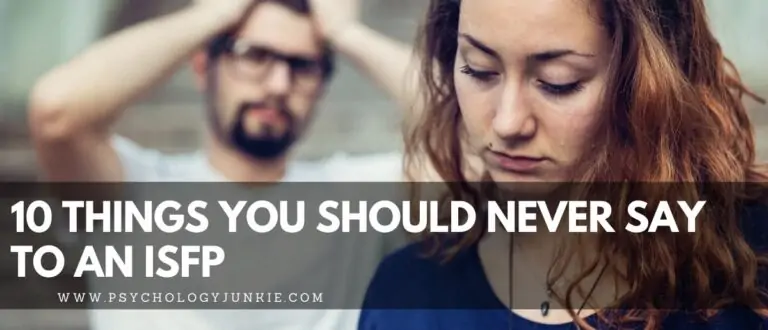
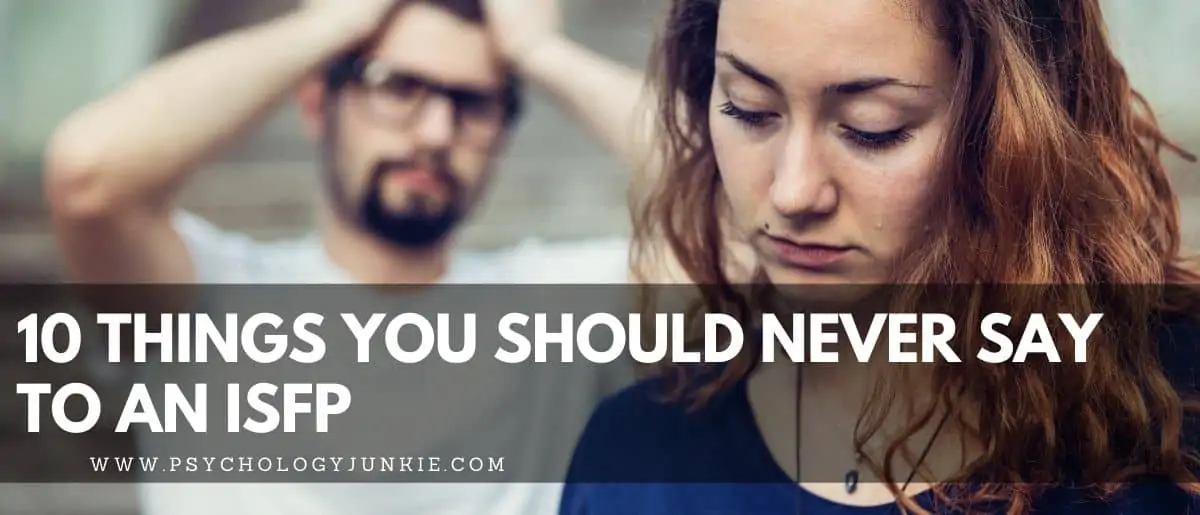
This INTJ craves affection from family members, appreciates caring touches and hugs from friends. All others must keep their hands off; my body is not theirs to handle! Physical touch IS about conveying love and caring. No relationship exists with strangers.
I love all the surveys you do and how you present the data! So often websites will make assumptions about the MBTI types based on theory, but you actually survey people to get real data, which is wonderful!
I’m in between INTJ and INFJ, and I’m very reserved. (I think it has to do with how mean people have been to me all my life, including my mother.) I don’t mind receiving affection, but I don’t like to initiate it myself. I don’t find it necessary; my love should be self-evident. To me, affection doesn’t prove love either, because affection is so easy to give (for most people). It’s like words, which can be lies. I’m more convinced of love when someone does something for me that they know I want even if it’s unpleasant for them, rather than them doing something for me which pleases them too. Affection is often like that—person A shows love that way to person B because person A likes affection. What about considering what person B wants or likes?
My lack of initiating affection is the reason my ENTP ex broke up with me. Most people might assume a thinking type like ENTP would not be craving affection so much, but my ENTP ex definitely did, and it looks like from this data, a lot of other ENTPs are the same way! MBTI sites will say ENTP and INTJ are the perfect match, but given their vastly differently love languages, I think they’re not. As a strong J type, I don’t think I could ever be completely happy living with a lazy, flighty P type.
So not surprised with INTx, but quite surprised about ISFP!! Interesting! And also ENTP 😂
Quite funny to see where xNTP and xSFP rank, comparatively 😊
I’m an ISFP and the quote by the ISFP is exactly how I feel! I like being cuddled and hugged by my significant other and I’m ok with hugging close friends, but I hate how acquaintances (or people I barely met for the first time) want to hug in greeting! It’s like, can we just shake hands or wave at each other instead?!? Lol
Quality time and words of affection are my main love languages, but I’ve had to become quite adept at physical touch, my wife’s primary love language. I’m an ISTP; as for my wife, I don’t know, though she may be more extroverted.